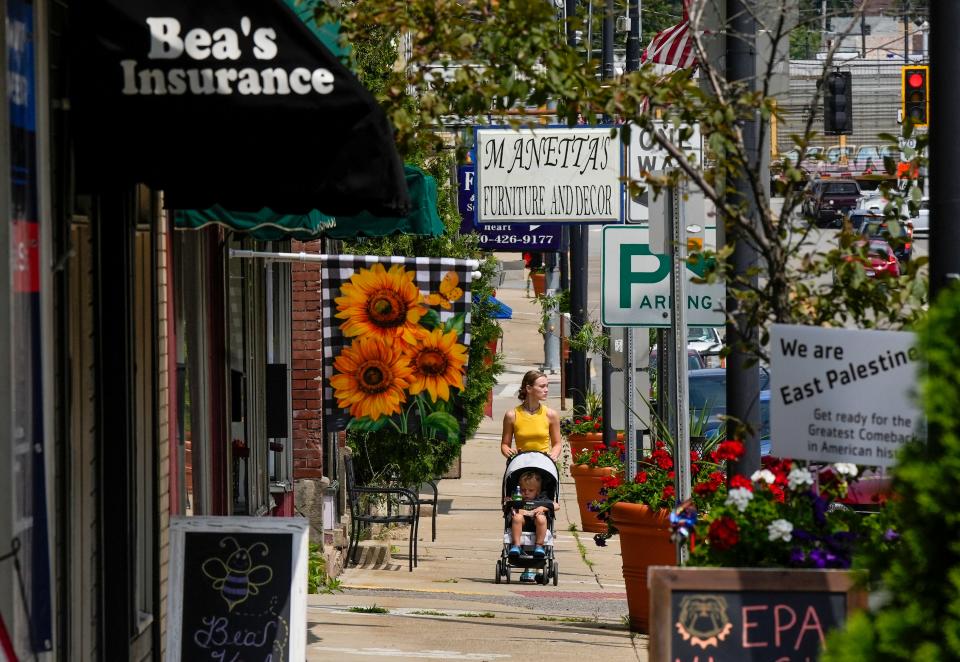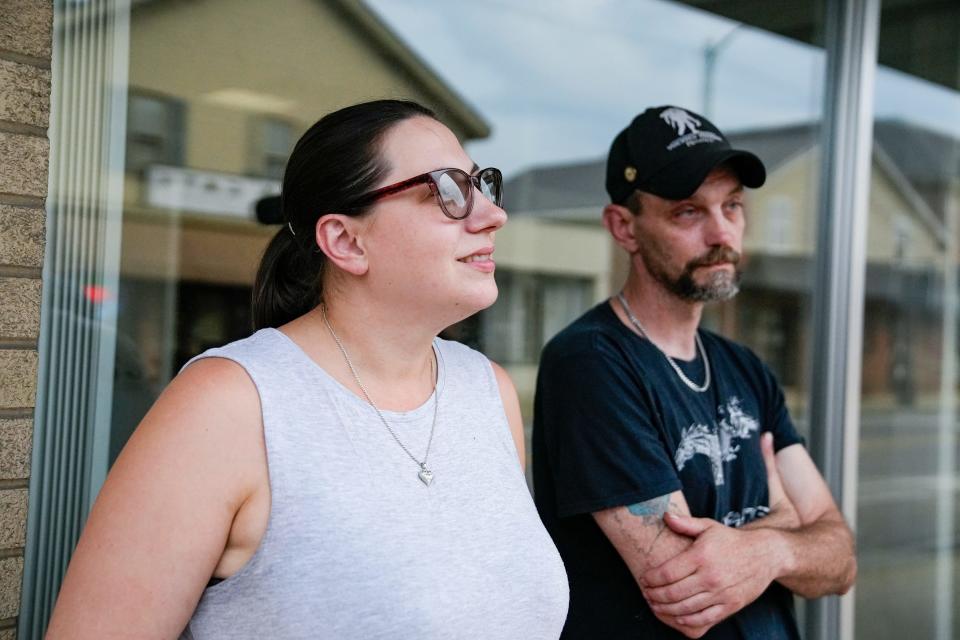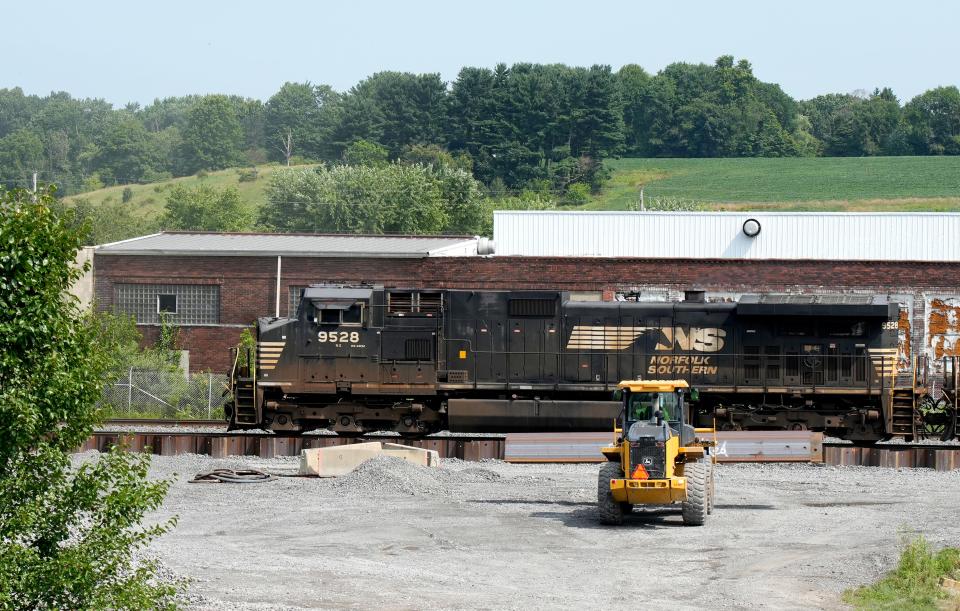After toxic train derailment, this man moved to ground zero to be closer to his family
EAST PALESTINE, Ohio − On any given morning, Beau Figley wakes to the sound of a train passing, a construction truck backing up or a jackhammer pounding.
The noise has taken a toll on him. It's never ending.
"I can't say that I'm happy to be here," Figley said. "It's a little bit of a depressing atmosphere with all of the stuff going on. I moved here out of desperation."
Just weeks after a train derailment spewed thousands of toxic chemicals into East Palestine's air, Figley made the long trek from Washington to Ohio to be closer to his family. He faced multiple barriers in finding a place to live at first. He needed something in his price range, and many rentals that he looked at didn't allow dogs. He finally found a house to rent on Taggart Street that would accommodate those needs. But that rental was ground zero of the derailment.
East Palestine: 'We're afraid we'll be forgotten:' residents want answers after derailment
Derailment: Residents face long road ahead in East Palestine

His backyard is mere feet from the railroad. And his life has been chaos ever since he arrived.
"It's been difficult for me," he said.
While residents of East Palestine have come a long way in the six months since the toxic disaster, stories like Figley's remain. The cameras are mostly gone and celebrity visits have subsided. But long-time residents – and a few newcomers like Figley – still are struggling to define what life in East Palestine will become in the months and years after the derailment.
The noisy, constant work in Figley’s backyard adds to the challenge. It's the product of more than $800 million in spending to clean up the derailment site by removing tons of contaminated soil and millions of gallons of wastewater.
It’s difficult to think about the future, Figley said, when reminders of the past are everywhere.
Figley tries to block it out the best he can. He doesn’t even like talking about the derailment and the recovery with his neighbors.
"When I hear it, I just kind of walk away," he said.
Six months later, East Palestine train derailment remediation continues
Mark Durno arrived in East Palestine having helped assist with disasters such as the Flint water crisis in Michigan and Hurricane Katrina in New Orleans. This assignment, however, hit home for the veteran response coordinator for the U.S. Environmental Protection Agency. Durno grew up in Cleveland and played football against East Palestine in high school.
He arrived to find contaminated water that killed nearly 40,000 fish in the village's Sulphur and Leslie Run tributaries, while residents regularly raised concerns about air quality and drinking water. The EPA has consistently determined that drinking water and air quality have been at safe levels all along. Still, it performs millions of tests out of an abundance of caution. The EPA has a welcome center located in downtown East Palestine, where staff are set up to answer any questions residents might have.
After removing 26.2 million gallons of wastewater, the agency has determined conditions in the water around East Palestine are slowly improving. There are signs that aquatic life is returning to the village's waters. Species of amphibians such as the rare and endangered hellbender salamander have been spotted by the Ohio Department of Natural Resources recently despite ongoing contamination in both tributaries.

Then there's the day-to-day work on soil remediation. Inside a large perimeter blocked off near the derailment site, dozens of workers continue to run tests in the air, remove contaminated soil and store contaminated water inside large tanks that hold up to a million gallons of water until they are cleaned and transported elsewhere. More than 10,000 tons of contaminated soil have been removed from the derailment site and another 82,000 tons from a small area around the derailment.
Residents were told initial remediation efforts would be completed by the end of August. Given some of the complications they've discovered, that timeline will likely be closer to October, Durno said.
The physical repairs are a promising first step. But the emotional repair of East Palestine will take some time, Durno said.
It will help, he said, when the dump trucks and water tanks from the cleanup effort are gone.
"I don't really think, from a healing perspective, the community can really get into a true healing process until probably another year or two," Durno said.
East Palestine is no 'ghost town'
Since the derailment, 200 homes in the 4,700-resident village have sold. Youth sports in town shifted to play all of their games on the road because no other schools would drive to East Palestine to play. That caused a loss of about $30,000 that was later donated by Norfolk Southern Corp., the rail company responsible for the derailment.
So far, Norfolk Southern officials say, the railroad has spent $803 million to clean the site and reimburse residents. The work going on around the derailment site is the most visible sign of how much damage was done, but it also is a constant reminder that the recovery is underway.
A few businesses in East Palestine have closed their doors since Feb. 3 and some residents moved, but that tide is slowly turning. Home sales in the village have picked up over the last few months. One house recently sold for $300,000, a high number for the village even before the derailment. And an annual fireworks show on the Fourth of July in the village's park drew so many people to town this year, Mayor Trent Conaway expressed concerns about the crowds at a recent council meeting.
"We had every officer out this year and I was directing traffic because they were all busy with other stuff," Conaway said.

Norfolk Southern continues to reimburse residents for losses or costs connected to the derailment. While the company has faced intense scrutiny over the derailment, and is responsible for four of the five costliest accidents involving hazardous materials in Ohio over the past ten years, Conaway said he believes the company is attempting to make things right.
"I think they're delivering on what they said they would," Conaway said.
Market Street in downtown East Palestine has also picked back up over the last few months. A number of new businesses such as Kat's Krystal's have opened recently. And while many homes went up for sale and natives moved out, the village has welcomed some new residents like Arlene Sivy and Mark Worrall.
"We just moved here and everybody is really nice so far," Worrall said.
"This place has always been wonderful," said Sivy, who moved to East Palestine with her fiancé Worrall from Beaver Falls, Pennsylvania and hopes to one day open a restaurant in the village.

Residents like Jessica Helpy, who out of concern for herself and her children moved away from East Palestine temporarily, have also returned to the village.
"We're making it work," said Helpy, who relocated to Northern Kentucky for a few months after experiencing symptoms such as rashes on her skin in the days following the derailment. "I came in and I threw out maybe 35-40 contractor bags of stuff. Sort of liberating to get a good cleaning of your house done."
Conaway predicts the village will rebuild and redefine itself within the next two years, when the cleanup is over and residents can return to something that more closely resembles normal life.
"I think the wrong image is being put out that it's a ghost town now," the mayor said.
He said about 200 residents still haven’t returned after leaving in the wake of the derailment. But others, like Figley, Sivy, and Worrall, have moved in.

Vanessa Kastanek, a waitress at Original Roadhouse, which is located near the city's park, isn't so sure of the village's rebound.
She’s noticed a decline in restaurant patrons across the village since February. She hears people around town talk about returning to normal, but she doesn’t see enough evidence of it yet.
"I don't know if they're actually not affected or they're just in denial," she said while on a walk downtown, pushing her three-year-old son, Ezra, in a stroller.
As she spoke, a dump truck rumbled past.
"It's still the talk of the town," she said.
This article originally appeared on Cincinnati Enquirer: East Palestine cleanup bill tops $800M after toxic train derailment

